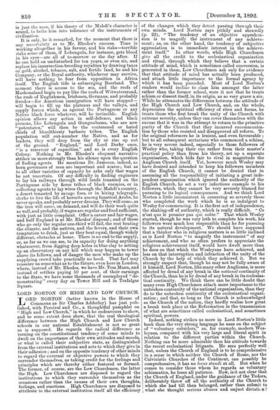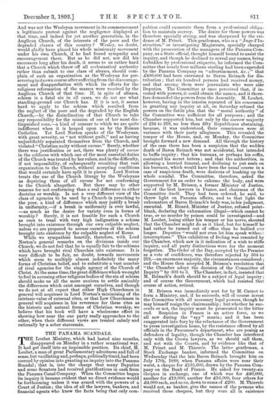LORD NORTON ON HIGH AND LOW CHURCH.
T ORD NORTON (better known in the House of Commons as Sir Charles Adderley) has just pub- lished, with Percival and Co., a thoughtful pamphlet on " High and Low Church," in which he endeavours to show, and to some extent does show, that the real theological difference between the High Church and Low Church schools in our national Establishment is not so great as is supposed. He regards the radical difference as turning on the constitutional tendency of some minds to dwell on the importance of their own attitudes and moods, or what is called their subjective state, as distinguished from the external institutions and acts to which they give in their adhesion ; and on the opposite tendency of other minds to regard the external or objective powers to which they surrender themselves, as taking credit for the feelings and principles which are thereby either fostered or formed. The former, of course, are the Low Churchmen, the latter the High. Low Churchmen are disposed to regard the institutions to which they surrender themselves as the occasions rather than the causes of their own thoughts, feelings, and emotions. High Churchmen are disposed to attribute to the external institution itself all the efficiency of the changes which they detect passing through their own minds. Lord Norton says pithily and shrewdly (p. 22), " The tendency of an objective apprehen- sion is to magnify the instrument of any achieve- ment; as, on the other hand, the tendency of subjective appreciation is to immediate interest in the achieve- ment itself." In other words, while High Churchmen give all the credit to the ecclesiastical organisation and ritual, through which they believe that a certain attitude of mind, which is sometimes called conversion, is generated in them, Low Churchmen ask only for evidence that that attitude of mind has actually been produced, and attach little importance to the formal agency by which it has been preceded. Most of Lord Norton's readers would incline to class him amongst the latter rather than the former school, were it not that he treats schism or dissent itself, in its origin, as so very grave a sin. While he attenuates the differences between the attitude of the High Church and Low Church, and, on the whole, depreciates the spiritual efficiency of rites and forms, he treats those who first break the unity of the Church with extreme severity, unless they can cover themselves with the excuse that it was in the attempt to return to the primitive purity of the Church that they incurred excommunica- tion by those who resisted and disapproved all reform. To the original reformers he is lenient, and even favourable ; but to all subsequent sectarians who commenced a schism, he is very severe indeed, especially to those followers of Wesley who, taking their cue rather from their master's practical policy than from his theory, set up a separate organisation, which bids fair to rival in magnitude the Anglican Church itself. Yet, however much Wesley may have desired and intended to keep his followers members of the English Church, it cannot be denied that in assuming all the responsibility of initiating a great inde- pendent organisation which ignored the authority of the English Church, he set a very infectious example to his followers, which they cannot be very severely blamed for pursuing to its logical consequences. And we think Lord Norton a little inconsistent in censuring so severely those who completed the work which he is so indulgent to Wesley for commencing. It is the first act of independence., the shaking-off of authority, which is really difficult. " Ce n'est que le premier pas qui colite." That which Wesley started, though he was very loth to complete his work, his followers were much less responsible than he for pursuing to its natural development. We should have supposed that a thinker who in religious matters is so little inclined as is Lord Norton " to magnify the instrument " of any achievement, and who so often prefers to appreciate the religious achievement itself, would have dwelt more than he does on that which the Wesleyans have achieved, and less on that interruption and infraction of the unity of the Church by the help of which they achieved it. But we strongly suspect that, though he may not be fully aware of it himself, Lord Norton, like many other Anglicans, is more affected by dread of any break in the national continuity of the Church, than he is by dread of any break in its ecclesias- tical continuity. We think there can be little doubt that many even High Churchmen attach more importance to the unbroken continuity of the national organisation, than they do to the unbroken continuity of the ecclesiastical organi- sation ; and that, so long as the Church is acknowledged as the Church of the nation, they hardly realise how great a break took place at the Reformation in the transmission of what are sometimes called ecclesiastical, and sometimes spiritual, powers. Indeed, nothing strikes us more in Lord Norton's little book than the very strong language he uses on the subject of "voluntary outsiders," as, for example, modern Wes- leyans, compared with his very large and liberal spirit in relation to the different parties within the Church. Nothing can be more admirable than his attitude towards the recent ecclesiastical litigants. He sees perfectly well that, unless the Church of England is to be comprehensive in a sense in which neither the Church of Rome, nor the Calvinistic Churches of the Continent, can possibly be comprehensive, it has no locus standi at all. But when he comes to consider those whom he regards as voluntary schismatics, he loses all patience. Now, is it not clear that the Church of England, under the guidance of the Tudors, deliberately threw off all the authority of the Church to which she had till then belonged, rather than submit to what she thought serious abuses and unjust dictatii n ? And was not the Wesleyan movement in its commencement a legitimate protest against the negligence displayed at that time, and indeed for yet another generation, in the Anglican Church, of the interests of the poor and the degraded classes of this country ? Wesley, no doubt, would gladly have placed his whole missionary movement under his own Church, if he had found sympathy and encouragement there. But as he did not, nor did his successors long after his death, it seems to us rather hard that a Church which threw off all ecclesiastical authority rather than submit to one class of abuses, should com- plain of such an organisation as the Wesleyan for per- severing in its own course after suffering from the discourage- ment and disapprobation with which its efforts for the religious reformation of the masses were received by the Anglican Church of that time. If, in spite of abuses, schism is a fatal sin in all cases, we do not see what standing-ground our Church has. If it is not, it seems hard to apply to the schism which resulted from the neglect of the poor and the degraded by the English Church,—by the disinclination of that Church to take any responsibility for the mission of one of her most dis- tinguished sons,—a kind of censure to which we are quite indifferent when it is heaped upon us by the Roman Catholics. Yet Lord Norton speaks of the Wesleyans, with great severity, as " not without guilt," and as having unjustifiably separated themselves from the Church, and violated " Christian unity without excuse." Surely, whether there was justification or not, there was plenty of excuse in the coldness with which one of the most essential duties of the Church was treated by her rulers, and in the difficulty, if not impossibility, of subsequently reuniting that vast organisation to the Church, without accepting conditions that would certainly have split it in pieces. Lord Norton treats the use of the Church liturgy by the Wesleyans as depriving them of all excuse for not conforming to the Church altogether. But there may be other reasons for not conforming than a real difference in either doctrine or worship. Is not a very different view of the class of agencies to be used by a Church in preaching to the poor, a kind of difference which may justify a break in uniformity,—if a break in uniformity is ever lawful, —as much as the desire for variety even in forms of worship ? Surely, it is not feasible for such a Church as ours to treat with very high indignation a schism brought into existence through our own culpable neglect, unless we are prepared to accuse ourselves of the schism brought into existence by the culpable neglect of Rome. While we sympathise heartily, therefore, with Lord Norton's general remarks on the divisions inside our Church, we do not feel that he is equally fair to the schisms which have brought rival Churches into existence. It is very difficult to be fair, no doubt, towards movements which seem to multiply almost indefinitely the many forms of Christian belief, and to substitute a vast number of rival agencies for the single agency of the Church of Christ. At the same time, the great diffidence which weought to feel in accusing other religious bodies of the sin of schism should make us all the more anxious to settle amicably the differences which exist amongst ourselves, and though we do not at all expect that either High Churchmen in general will acquiesce in Lord Norton's minimising of the intrinsic value of external rites, or that Low Churchmen in general will acquiesce in his reverence for these rites as the historic and natural forms of Christian worship, we believe that his book will have a wholesome effect in showing bow near the one party really approaches to the other, when their different views are treated calmly and rationally by a sober statesman.



















































 Previous page
Previous page